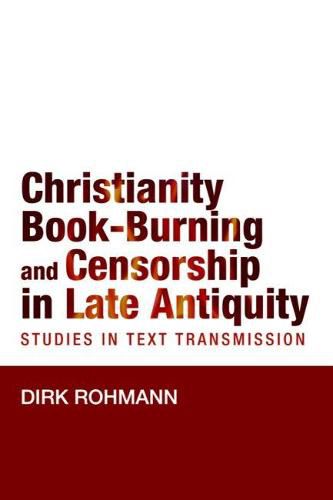Readings Newsletter
Become a Readings Member to make your shopping experience even easier.
Sign in or sign up for free!
You’re not far away from qualifying for FREE standard shipping within Australia
You’ve qualified for FREE standard shipping within Australia
The cart is loading…






Only a small fraction of ancient literature survivesaless than one percent,estimates reveal. While the reasons vary, it is an irony that Christianity, often regarded as responsible for the proliferation and spread of books and book culture, was likewise active in suppressing and destroying books in Late Antiquity. Author Dirk Rohmann assembles the evidence for the role playedin book-burningby Christian institutions, writers,and saints duringtheRoman Empire.Rohmannanalyzes a broad range of literary and legal sources, paying special attention towhich genres and book types were likely to be targeted. Rohmann concludes that, in addition to heretical, magical, astrological,and anti-Christian books, other less obviously subversive categories of literature were also vulnerable to destruction and censorshipthrough prohibition ofmanuscriptcopying. These texts included worksfrom materialistic philosophical traditions, texts that were to become the basis for modern philosophy and science. Whilebook-burning functioned as a recognized cultural practice, and Rohmann acknowledges the wide variety of motivations at work in the various practices of censorship, he ultimately asks to what extent Christian book-burning and accompanying practices negatively affected the survival of pagan and pre-Christian literary and philosophical texts. Christianity’s rejection, even obliteration, of booksaso contrary to its own worldviewatestifies both to the perilous nature of texts in transmission as well astothe enduring cultural and ideological power of the written word.
$9.00 standard shipping within Australia
FREE standard shipping within Australia for orders over $100.00
Express & International shipping calculated at checkout
Only a small fraction of ancient literature survivesaless than one percent,estimates reveal. While the reasons vary, it is an irony that Christianity, often regarded as responsible for the proliferation and spread of books and book culture, was likewise active in suppressing and destroying books in Late Antiquity. Author Dirk Rohmann assembles the evidence for the role playedin book-burningby Christian institutions, writers,and saints duringtheRoman Empire.Rohmannanalyzes a broad range of literary and legal sources, paying special attention towhich genres and book types were likely to be targeted. Rohmann concludes that, in addition to heretical, magical, astrological,and anti-Christian books, other less obviously subversive categories of literature were also vulnerable to destruction and censorshipthrough prohibition ofmanuscriptcopying. These texts included worksfrom materialistic philosophical traditions, texts that were to become the basis for modern philosophy and science. Whilebook-burning functioned as a recognized cultural practice, and Rohmann acknowledges the wide variety of motivations at work in the various practices of censorship, he ultimately asks to what extent Christian book-burning and accompanying practices negatively affected the survival of pagan and pre-Christian literary and philosophical texts. Christianity’s rejection, even obliteration, of booksaso contrary to its own worldviewatestifies both to the perilous nature of texts in transmission as well astothe enduring cultural and ideological power of the written word.